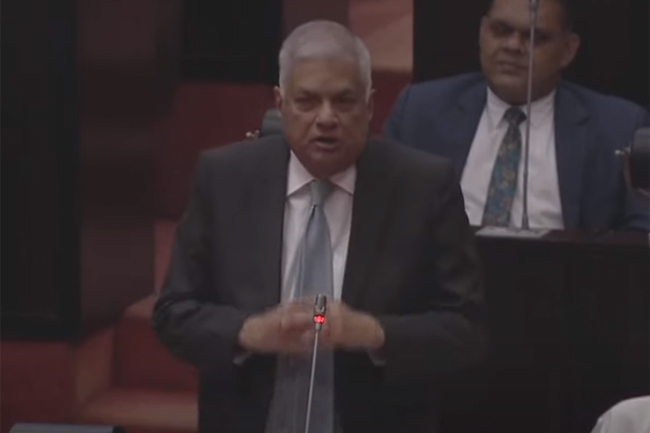President addresses parliament on economic revival progress
March 6, 2024 09:39 am
President Ranil Wickremesinghe arrived at the parliament this morning (March 06) to deliver a special statement on the progress of Sri Lanka’s economic recovery process.
The parliamentary proceedings, presided over by Speaker Mahinda Yapa Abeywardena, commenced around 9.30 a.m.
Addressing the Chamber, the Head of State said the citizens are now benefitting from the ‘strenuous efforts’ taken by the government to revive the economy.
“We made an ‘economic plan’ with the IMF. As a result of implementing this plan, the country returned to normalcy day by day. This reduced the pressure [on the people] and alleviated the hardships.”
Wickremesinghe further mentioned that the country’s economy, which contracted for six consecutive quarters, began to revive in the Q3 of 2023, while adding that international financial institutions have forecast a potential economic growth for Sri Lanka, ranging from 2% - 3% for the year 2024.
Speaking further, the President revealed that state revenue witnessed a significant growth of more than 50% in 2023 as opposed to 2022. “A surplus was achieved in the primary account last year. As a result, the government was able to settle all outstanding payments owed to contractors who had rendered services to the government for the past 3-4 years,” he added.
Meanwhile, inflation has plummeted from 70% in September 2022 to a mere 5.9% in February 2024, the President mentioned, attributing it to the coordinated macroeconomic demand management endeavours by both the Central Bank and the government. Inflation dipping to 5.9% offered respite to small- and medium-scale enterprises (SMEs) and consumers, he explained.
He also announced that the usable foreign exchange reserves, which stood at less than USD 20 million in mid-April 2022, have now soared past USD 3 billion. Further, import restrictions, except for private motor vehicles, have also been lifted now, he continued.
With regard to debt restructuring negotiations, the President said the successful outcome of these discussions will diminish annual external debt payment from 9.5% to 4 % of GDP.
Additionally, the government revenue can be maintained at a substantial level if the current trend of economic growth experienced in 2022 and 2023 persists, Wickremesinghe added, emphasizing that under these circumstances, servicing the debt will not impose a burden on the country.
“Our goal is to obtain temporary relief from debt defaults from 2023 to 2027. Subsequently, we plan to diligently work towards repaying the loans in the period from 2027 to 2042.”
Deeming the implementation of the Value-Added Tax (VAT) a ‘bitter and challenging’ decision, the President said this move, however, helped boost state revenue to nearly 11% of the GDP.
“We must endure this temporary pain for the greater good.”
The President opined that if the current trajectory is continued with the same vigour, the country’s economy would be in significantly better shape by the end of this year. “Additionally, we’ve ceased the practice of using taxpayers’ money to cover the losses of government institutions. Instead, we’re restructuring these institutions and transferring them to investors.”
Meanwhile, the government is actively pursuing essential legal reforms to strengthen and modernize the legal framework, systems, and processes, which he said aim to improve public financial and economic management for the benefit of all. “In a ground-breaking move for South Asia, the Governance Diagnostic Report has been released, and on-going efforts are underway to enhance governance and mitigate corruption risks. We’re also attracting investments and establishing a new institution for this purpose.”
He revealed that efforts are underway to modernize the island’s agriculture sector, with several foreign countries expressing interest in starting large-scale farms under food security initiatives. “We’re gradually unlocking foreign markets for exports, focusing on non-traditional export items.”
The goal of the government is to transform Sri Lanka into a green and digital economy and establish it as a regional economic and service hub, with plans to make the Port City an international financial hub, he continued.
The measures implemented by the government thus far have allowed for the provision of numerous facilities and concessions to the majority of citizens, the President emphasized.
Adding to this, he said, “Under the ‘Urumaya’ program, two million families will acquire land ownership, reclaiming inherited land lost over generations.
“We’ve tripled social security spending to protect the poor and vulnerable from the economic crisis, benefiting 2.4 million low-income families with “Aswesuma.” Around 4.5 million schoolchildren are now covered by the “Suraksha” insurance scheme.
“Every school teaching information technology now has smart classrooms, and 100,000 school children have received scholarships through the President’s Fund. The funds allocated to patients from the President’s Fund have been doubled.
“Development initiatives have begun in numerous villages across 89 Divisional Secretariat divisions as part of the “Kandukara Dashakaya,” with each regional secretariat allocated Rs.100 million for this purpose. Development activities in constituencies are underway through the decentralized budget, and agricultural modernization initiatives have been launched across 25 Divisional Secretariats.
“Tourism is on the rise, benefiting many individuals, and we’re working to further enhance its development. The economy, which had contracted, is now gradually recovering, leading to relief for the people.
“We’ve suspended the Parate law for business establishments and offered relief on electricity bills this week. Additionally, we aim to exempt items such as books, school equipment, health equipment, and medicine from the VAT list to continue reducing the VAT rate.”
The President asserted that the government is ‘diligently strengthening’ the economy day by day, striving tirelessly to improve the lives of the people and fortify the economy. “Our actions are guided by a strategic plan, ensuring a systematic and methodical approach.”
Wickremesinghe reiterated that his actions are not driven by personal popularity or power but by a dedication to the future of the country.
While certain segments of society have faced hardships due to our current practices, the government is striving to uplift the entire society and establish a sustainable economy where growth benefits all.












